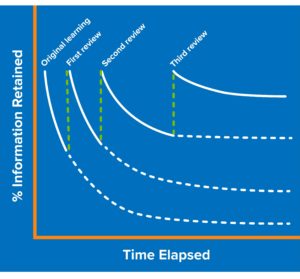How to Retain Information in Medical School
- by
- Aug 18, 2022
- Reviewed by: Amy Rontal, MD

Ask anyone in medical school, and they’ll tell you that it isn’t the actual content that’s hard.
“Then what’s hard?” you might ask.
It’s the sheer amount of information that you are expected to retain. Luckily, we have three effective study strategies for medical school that you can start using immediately to help you retain information (and actually work)!
Three Effective Study Strategies for Medical School
Have you ever crammed the night before a test? I think we probably all have, maybe more than we’d like to admit. In the past, cramming may have been your only option when you were short on time. Maybe you were taking a heavy courseload, working a job or two, and juggling other personal obligations. You may have even seen positive results after cramming for a test.
Cramming can be useful for short-term retrieval of information that you won’t need to remember and use later, like remembering how to conjugate pluperfect verbs in Latin or remembering the state capitals. Now that you’re in med school, however, you’re learning material that you’ll need to be able to remember beyond the test, which means your days of successful cramming are history.
1. Spaced Practice
Spacing out your study sessions and revisiting concepts more than once improves remembering. The things you are learning in med school are knowledge and skills you will use in the future to solve problems and care for patients which means cramming won’t help you.
Spaced practice is a technique that involves reviewing information and practicing problems at optimal intervals. You review a difficult concept frequently and space this out over time until you can remember the information on your own and are easily able to recall it.
This reminds us: spaced practice is hard to talk about without also talking about retrieval practice. Our second strategy recommendation is retrieval practice.
2. Retrieval Practice
Practicing recall, or trying to retrieve information from memory, is a critical part of studying. This is the actual “practice,” or putting your knowledge into action. You’re practicing what you will do when caring for patients in a clinic or on an exam.
You may be thinking that you shouldn’t have to memorize anything because you’ll be able to look up information while caring for patients. You’re correct: for the most part, you will be able to look stuff up. How long do you think it will take for you to look up each sign and symptom a patient presents, then the etiology, pathophysiology, contraindications…. You see where we’re going with this? Then, once you look all that up, analyze and synthesize the info, determine if any diagnostic studies and labs are needed, come up with some differentials… I think you get the point.
You need to be able to retrieve and use the knowledge and skills you’re learning in med school by using (practicing) retrieval and applying the knowledge and skills around those concepts. Spaced practice and retrieval practice are important practices for learning and retaining information for later use.
To help you space out your retrieval practice, planning your study sessions ahead of time will set you up for success.
3. Planning Your Study Schedule
The third strategy recommendation is scheduling. Instead of looking to see what is due next, plan out your study schedule ahead of time. Knowing what you need to learn and when you need to learn it will help ensure you engage in spaced and retrieval practice. Planning takes some time upfront, however it saves you time in the end. You won’t be wasting time trying to decide what to study each day, you’ll just follow what you planned.
Ebbinghaus’ Forgetting Curve shows how quickly and how much we forget new material. From the diagram below, you’ll see that you’re most likely to forget information right after you’ve learned it. To combat this, Ebbinghaus said to review information at close (optimal) intervals.

Source: MindTools
In short, revisiting material and studying over time helps you retain information longer. Ebbinghaus’ Forgetting Curve supports spacing out your studying sessions both while taking a course and after the course ends.
Get to PRACTICE!
Using these strategies will set you up for success in medical school and beyond.
Spaced Practice: Studying over multiple sessions (the opposite of cramming) and revisiting knowledge and skills multiple times improves retention.
Retrieval Practice: Very effective for improving long-term retention of information.
Planning Ahead: Planning your study schedule focuses on learning. By spreading out study sessions and revisiting topics, you won’t waste time deciding what you should study each day.
Make your schedule and get to practice!
Further Reading
About the Author
Dr. Susan Hibbard is a senior director of learning science and psychometrics at Blueprint and former director of assessment and evaluation and faculty member at the Duke University School of Medicine. She is an expert in helping learners increase performance, psychometrics, and data analysis. Her work centers around answering "what works, under which conditions, for whom, and why?"









